Report DAY 2, PM 8th Dec
Ichihime Gagaku-kai
Entertainment 'Gagaku and dance'
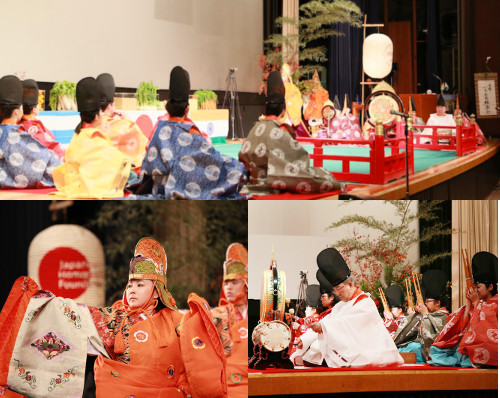
Court dance and music 'Banzairaku' was performed by Ichihime Gagaku-kai. Ichihime Gagaku-kai was established in 1980, aiming at spreading Gagaku as a Japanese traditional music by Tomihisa Hida. In order to hand down Gagaku properly, Shigeru Iwanami at Board of the ceremonies in Imperial Household Agency, directly teaches more than 200 members from variety of age group who practices musical instruments and dance every day. A beautiful Gagaku stage was set and dancers danced in the middle of the stage surrounded by traditional musicians with traditional and bright costumes. Court dance and music is Japanese traditional culture, having more than 1,000 year history, which has a deep relation with Imperial court and Shindo. The performance was appropriate to the congress venue in Meiji Jingu.
Dr Gustavo Bracho
Homeopathy and Ultra dilutions: From Basic Evidences to Practical Applications
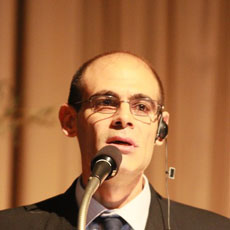
Following the day 1, Dr Gustavo Bracho came on stage. He gave a presentation scientific clinical experiments to show why homoeopathic remedies work. Homoeopathy is often called 'Pseudoscience', 'non evidence-based' or 'placebo'. Homoeopathic remedies are made by diluting the original substances to detoxify and succussing it to dynamite it (potentiating). It is often criticized why homoeopathic remedies could work in spite of its high dilution. Clinical experiments are held to prove the effects of homoeopathic remedies at Finlay Institute. The experimental procedure was that various potencies are administrated in cultured cells and examine the differences of the effects. The effects and the potencies were not proportional. The experiment showed effective potency and non-effective potency appeared repeatedly as the potency is getting higher. It was the same result with the experiment using a mouse. Both of the experiments clearly showed the effects were more than placebo. The experiments relating to succession showed if a diluted substance is successes, electromagnetic wave which the substance radiates will be changed. From this result, it could be thought that a property of the original substance is transcribed onto water. It was an epoch-making presentation to understand the possibility of a fusion of science and homoeopathy very well, although homoeopathy is said that it is difficult to be proven in scientific way, it is actually possible if a design of the experiment is contrived.
Dr R. K. Manchanda
Evidence based Homeopathy in Dermatology
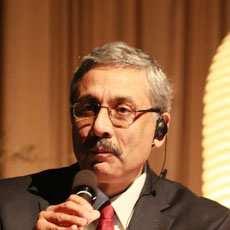
The presentation by Dr Manchanda on Day 2 was mainly about papers to prove the effects of homoeopathic remedies on dermatology scientifically. It was especially impressive among his various papers that he showed a paper which his team conducted a double blind trial in order to remove placebo effects of remedies. They prescribed homoeopathic remedies to 124 clients who suffered from warts and molluscum contagiosum. As a result, a group who was prescribed homoeopathic remedies had significantly higher curative rate than a group who was prescribed placebo. Since Hahnemann found homoeopathy over 200 years ago, many clinical experiments have been accumulated by many homoeopaths. There is enormous information regarding individual case analyses. However, there is a problem as the guideline is not standardized to share the information. Dr Manchanda showed a paper which the effect of remedy could not be admitted well as a result of objective analysis without having prejudice. However he commented that recording, analyzing and sharing such information are for improving treatment skills by homoeopaths and are necessary to prove homoeopathy scientifically.
Torako Yui Chairperson of JPHMA Congress
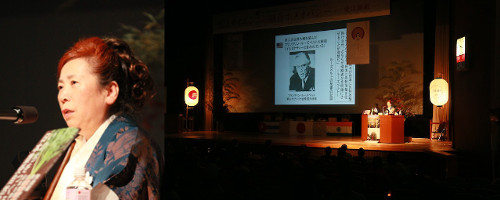
Torako Yui, the chairperson of JPHMA congress on Day 2, gave a presentation under with the theme of guilt feeling and inner child which Japanese people suffer. What Dr Yui thinks of Japanese clients over her 18 year clinical experiences is that many of them are suffering from 'self-denial feeling' and 'guilt feeling'. If they have such feelings, it is quite hard for them to be cured. When she visited affected area of Great East Japan Earthquake, she met many people who suffer from guilt feeling as 'I could not help my parent and my child, but I am still living and feel bad about it.' Dr Yui also had suffered from self-denial feeling and got over from the experience. One of the reasons why Japanese people are suffering from such feeling could be attributable to education in history which inculcates guilt feeling. Dr Yui says it is necessary that Japanese people know true history in order to avulse such self denial feeling and guilt feeling and regain a price as Japanese to cure diseases and live strongly. The self-denial feeling have serious affect on children's mind. Dr Yui showed her case studies, a child who had been troubled with bullying regained her smile, a child who had not been able to express his emotions and had been bullied started to express his agony and get better, showing many videos by DVD. College of Holistic Homoeopathy (CHhom) is offering Inner Child therapist course in order to solve problems in minds. Dr Yui is sincerely wishing everyone heals their own inner child, regain themselves who love and be loved, and live with pride as Japanese. In the end of her presentation, she showed JPHMA's activities for giving support at the Great East Japan Earthquake. The presentation was ended in a big applause.
Press Interview
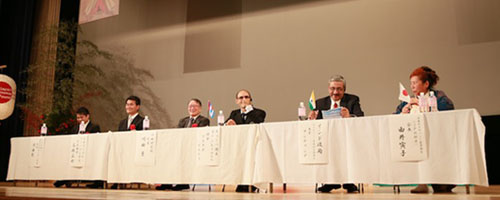
Press interview was held with the below member. The questions were not only by media press but also by delegates at the congress. That was a very beneficial time.
■Torako Yui, Chairperson of the JPHMA Congress (Chairperson of JPHMA)
■Dr R.K. Manchanda (Director General, Central Council for Research in Homoeopathy, India)
■Dr Gustavo Bracho (President Advisor, project in homoeopathy and biotherapy, Finlay Institute, Cuba)
■Dr Kaoru Kawada (Doctor of Science, Managing Director, The Kawada Laboratory)
■Dr Masayoshi Takahashi (Doctor of engineering, Representative of the board of directors of General incorporated association, Japan Micro Nano Bubble Society Corp)
■Dr Satoru Utsumi (Director, The Tokyo D.D. Clinic Director of the Incorporated nonprofit organization Yakugai-Kenkyu Centre)
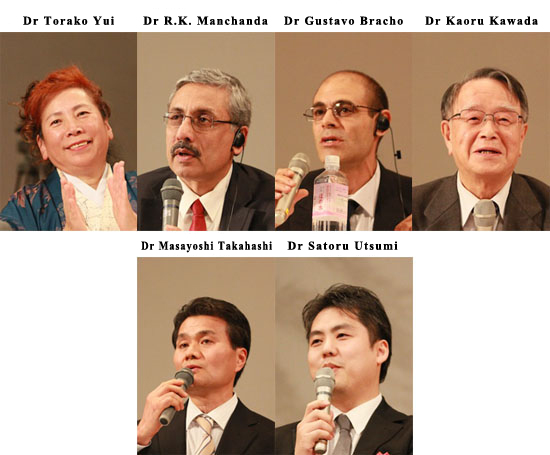
An acknowledgment of appreciation by Torako Yui, chairperson of the JPHMA congress
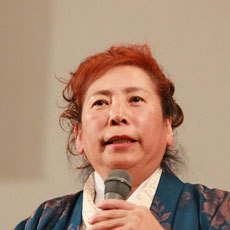
Dr You made a closing speech and appreciative words. 'I challenged to transmit love which I was weakest at this JPHMA Congress. I think I became very motherly in these few years. I can understand clients' feelings, students' feelings and homoeopaths' suffers as if they were my own. As we distress ourselves, we can grow. The joy after pains is much more. I had been experiencing various hardships, but I become able to transmit love. That is why I wanted to hold such a congress. I appreciate many homoeopathy supporters to attend the congress. It is only Japan who holds the congress with mixed delegates, homoeopaths, students and clients together, as it is normal for other countries to hold the congress at each categories. Please take care of yourself at this festive season. Please love yourself and relax. I would like to conclude the congress now. I am most grateful to all of you for attending the congress. I would also like to send my gratitude to all staff for supporting the congress. Thank you!' The message with full of love by Dr Yui got a lot of applause from the audience.
A general comment and a declaration of the closing
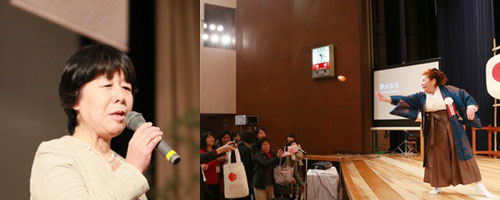
Ms Hideko Miyazaki made the general comment and the declaration of the closing on behalf of JPHMA. 'Thank you all. How was this 2 day JPHMA congress 'A Fusion of Love and Science. Love is invincible'? The guest scientist speakers showed a new world. The sun rises in the East and sets in the West without fail. I wonder this is the love. I declare to close the congress here. See you next year.' In the end, Dr Yui handed out tangerine oranges to the delegates. The congress was ended in a conciliatory mood. We thank to all speakers and delegates.
JPHMA interview
After the congress, we moved to College of Holistic Homoeopathy (CHhom) in Tokyo with Dr Manchanda and Dr Bracho and had JPHMA interview to them. They expressed their admiration for the high quality of the congress. They showed their empathy towards a bond of solidarity by Japanese homoeopaths under a strong leadership of Dr Yui and encouraged to keep moving ahead as it is. Both of them explained about history and current situation of homoeopathy in each country. In the end, they gave advice to keep data as a preparation for being approved by the government and translate homoeopathic journals for collecting oversea information. It was very valuable and hopeful that the representatives from two countries where homoeopathy is supported and promoted by their government offered their support and cooperation. Thank you so much, Dr Manchanda and Dr Bracho.







